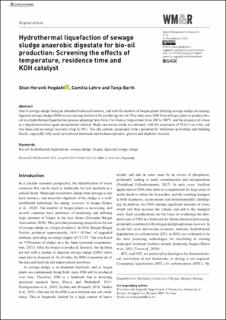Hydrothermal liquefaction of sewage sludge anaerobic digestate for bio-oil production: Screening the effects of temperature, residence time and KOH catalyst
Journal article, Peer reviewed
Published version

Åpne
Permanent lenke
https://hdl.handle.net/11250/3045391Utgivelsesdato
2022Metadata
Vis full innførselSamlinger
- Department of Chemistry [433]
- Registrations from Cristin [9791]
Sammendrag
Due to sewage sludge being an abundant biobased resource, and with the number of biogas plants utilizing sewage sludge increasing, digested sewage sludge (DSS) is a promising feedstock for producing bio-oil. This study uses DSS from a biogas plant to produce bio-oil in a hydrothermal liquefaction process adjusting time from 2 to 6 hours, temperature from 280 to 380°C and the presence of a base as a depolymerization agent and potential catalyst. High conversion yields are obtained, with the maximum of 58 wt% on a dry, ash free basis and an energy recovery of up to 94%. The oils contain compounds with a potential for utilization as biofuels and building blocks, especially fatty acids as biodiesel feedstock and biobased phenols, glycols and aliphatic alcohols.
